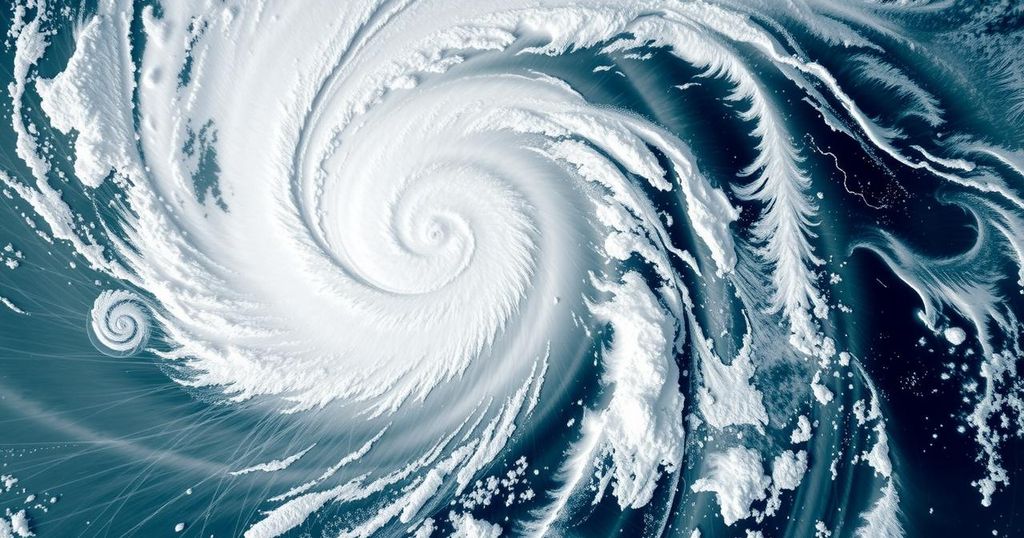World news
AFRICA, BIEUVILLE, CHI, CHIDO, DI, DIEKLEDI, DIKELEDI, EMERGENCY RESPONSE, EUROPE, FLORIANE BEN HASSEN, FRANCE, FRANCOIS -, HURRICANE BERYL, MADAGASCAR, MAYOTTE, MBOUINI, MET, MOZAMBIQUE, MOZAMBIQUE CHANNEL, NATIONAL OFFICE FOR RISK AND DISASTER MANAGEMENT, NATURAL DISASTER, NATURAL DISASTERS, PARIS
Fatima Khan
0 Comments
Storm Dikeledi Threatens Mozambique After Devastating Mayotte and Madagascar
Tropical Storm Dikeledi is heading towards Mozambique after causing three deaths in Madagascar and flooding in Mayotte. While the storm has weakened into a severe tropical storm, Mayotte remains on red alert due to anticipated strong winds and continued rainfall. Dikeledi’s development comes on the heels of Cyclone Chido, leaving the region particularly vulnerable to further storms.
Tropical Storm Dikeledi is currently on a trajectory towards Mozambique after causing destruction in Madagascar and triggering floods in Mayotte. Having transitioned from a cyclone to a severe tropical storm, Dikeledi left considerable devastation in its wake, claiming three lives in Madagascar, while causing extensive flooding in the French territory of Mayotte. Although officials reported no new casualties in Mayotte post-Dikeledi’s passage, the region is still under a red alert due to ongoing strong winds and rainfall.
Dikeledi made landfall in Madagascar as a powerful cyclone, bringing with it heavy rains and winds. Mayotte, which is still recovering from Cyclone Chido, which left at least 39 residents dead last month, remained on high alert as Dikeledi approached. Local authorities have stressed that the situation remains precarious, and, as such, advised residents to remain indoors.
The aftermath of Chido is still visible in Mayotte, where emergency personnel have mobilized to assist those affected by both storms. The French government has established accommodation centers for displaced residents. Dikeledi is expected to intensify further as it traverses the warm waters of the Mozambique Channel, posing a severe threat to the northern regions of Mozambique.
The frequency of tropical cyclones in the Indian Ocean has increased, with current sea temperatures indicating a greater potential for storm intensity. Experts link this phenomenon to climate change, which has resulted in warmer ocean temperatures, allowing storms to cultivate strength more rapidly. As of Monday morning, Dikeledi was positioned 150 kilometers off the Mozambican coast, and meteorologists anticipate that it may evolve into an intense tropical cyclone shortly.
Local residents in the storm-affected areas have expressed feelings of distress and helplessness as they grapple with the continued impacts of these natural disasters. Many fear for the upcoming rainy season and the potential for further flooding and damage.
The Indian Ocean is a region known for the seasonal development of tropical cyclones, especially between November and March. This time frame typically witnesses an uptick in storm activity due to favorable environmental conditions. In recent years, climate change has been increasingly linked to the increased severity and frequency of cyclones in this region, a trend observed globally in oceanic systems. Dikeledi follows soon after Cyclone Chido, which decimated parts of Mayotte, illustrating the compounded challenges faced by low-lying island territories that are more vulnerable to such climatic events.
In conclusion, Tropical Storm Dikeledi has wreaked havoc in Madagascar and Mayotte, while moving toward Mozambique. With the region still recovering from Cyclone Chido, concerns for further damages remain high. The ongoing state of emergency underscores the fragility of these territories as they face the dual challenges of climate change and natural disasters, compelling residents and authorities to prepare for potentially severe weather conditions ahead.
Original Source: www.cbs19news.com




Post Comment